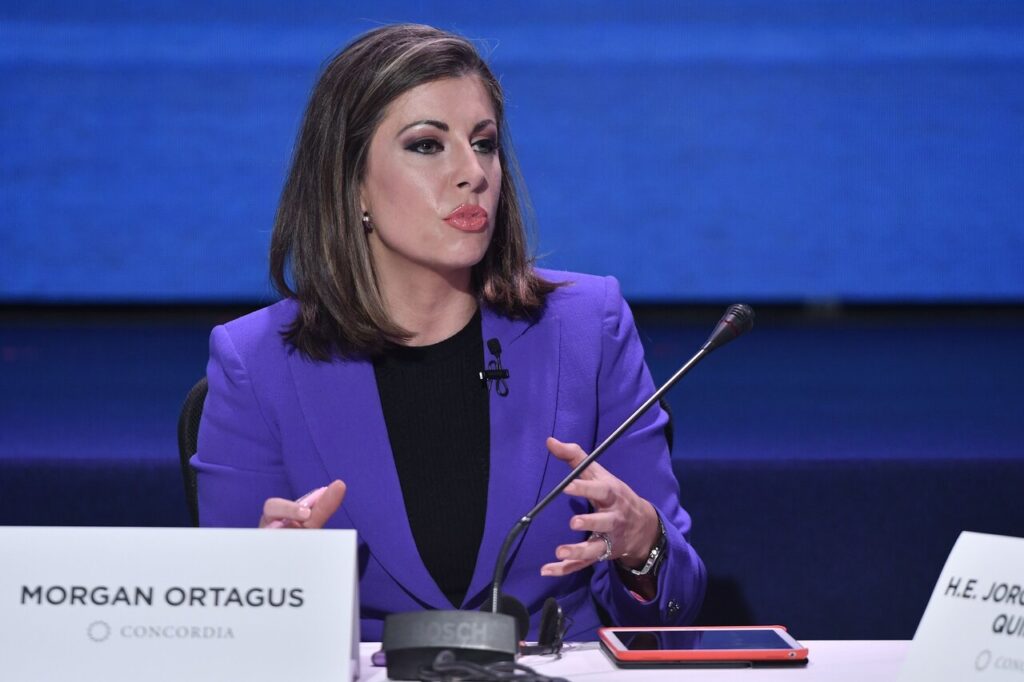BEIRUT — Israeli Channel 14 reported on Sunday that West Asia’s Vice President Envoy Morgan Ortags will soon leave her post. The news channel said the move “is not good news as Ortagus is a strong supporter of Israel and has taken a critical approach to the issue of disarming Hezbollah.”
Since US President Donald Trump assumed presidency, Ortags has visited Lebanon several times as part of Washington’s pressure on Lebanon, in the atmosphere and hints of aggressive steps towards Lebanon.
At the recent Qatar Economic Forum, Ortags said “Lebanon still has a lot to do to disarm Hezbollah,” claiming that Lebanese officials have “achieved more in the last six months than in the last 15 years.”
President Joseph Orn was reportedly invited a month ago to hold a live zoom interview with Washington’s Near East Policy Institute. However, Aoun’s political advisor warned of the negative consequences of such a move, especially as he is seen as the most important pro-Israel think tank overseen by David Schenker, a senior Taube fellow at the Washington Institute and director of the Linda and Tony Rubin programmes of Arab Politics.
Meanwhile, Wafiq Safa, head of Hezbollah’s liaison and coordination department, met with Lebanon’s UN special coordinator Jeanine Hennis-Plasschaert to discuss development along the Blue Line, repeated Zionist attacks on Lebanon, potential risks of escalation, and the need for compensation with resolution 1701.
Hezbollah is a heavy rock on Washington’s chest
Anyone observing development in Western Asia is well aware that the defeat suffered by the ongoing US-led invasion of Israel has led Tel Aviv and Washington to rely on a variety of tactics.
In a session assessing the situation in Palestine under occupied in the north, Eyal Zamir, chief of staff for Israeli attack forces, admitted, “The battle against Hezbollah is not over yet, so we will continue to pursue and weaken it until it collapses.”
Nevertheless, this is an unattainable goal. Hezbollah’s justice resistance is a vivid expression of concern at popular bases in the South, Southern Suburbs, Bekaa and other Lebanese regions.
This popular base believes in the doctrine of religious politics that complicates Washington’s mission. In any case, it is an integral part of the Velayat-e faqih doctrine, launched by Imam Khomeini, the founder of the Islamic Revolution over 40 years ago.
Eliminating Hezbollah means disappointing those who took part in the historic funerals of Hassan Nasrara and Hashem Safiedin, despite the threat of bombing and harsh weather conditions, and who have largely participated in local government elections in support of resistance.
Hezbollah is a flexible, decentralized organisation, intertwined with an exemplary society, and despite the massive and unexpected blows, he cannot reappear and remain silent every day.
To ensure Israel’s security, hand over Syria to Arjurani
The impossible goal of Eyal Zamir is simply to reassure the settlers of the Northern Colonies. But it is also consistent with the historical strategic changes seen in West Asia after the US-sponsored collapse of Syria.
Since December 2024, the HTS administration has not hidden its intention to adopt Washington’s strategic empire priorities.
In an interview with the Jewish Journal, Syrian appointed President Abu Muhammad al-Julani (now known as Ahmed al-Sharaa) said “the era of mutual artillery fire between Syria and Israel must end.”
“Syria and Israel have a common enemy, and they can play a major role in regional security,” he said. He expressed his desire to return to the liberation agreement signed in 1974, saying it was “as a fundamental guarantee of mutual restraint between Syria and Israel and as a protection of civilians.”
It is worth noting that the Jewish Journal is considered one of the most prominent Jewish media outlets in the United States covering issues of the Jewish community in Los Angeles.
Since the collapse of Syria, Arjurani has adopted strict methodologies aimed at tightening the rope around movement of resistance and blocking weapon supply lines.
This coincided with the imposition of Lebanon’s new political authority, adopting anti-public discourse, ignoring the imminent danger that threatened the country’s present and future.
Instead of reconstructing what was destroyed by the ongoing US-led Israeli attacks, the authority is blackmailing the Hezbollah community by blocking the arrival of humanitarian aid in Iran and Iraq and linking the reconstruction of destroyed homes to submission to Israeli demand.
While sponsoring a ceremony honoring the families of martial teacher education staff, Sayyed Hassan Fadlallah, a member of the Congressional Bloc of Hezbollah, criticised the position that contradicted the ministerial statement and constituted a retreat from the responsibility pledged by the government.
“The first paragraph of the Minister’s statement provides for the government’s commitment to promoting the reconstruction of what has been destroyed by the Israeli enemy, followed by a commitment to security, border protection, invader control and taking all measures to free Lebanon’s territory,” Fadrara said.

